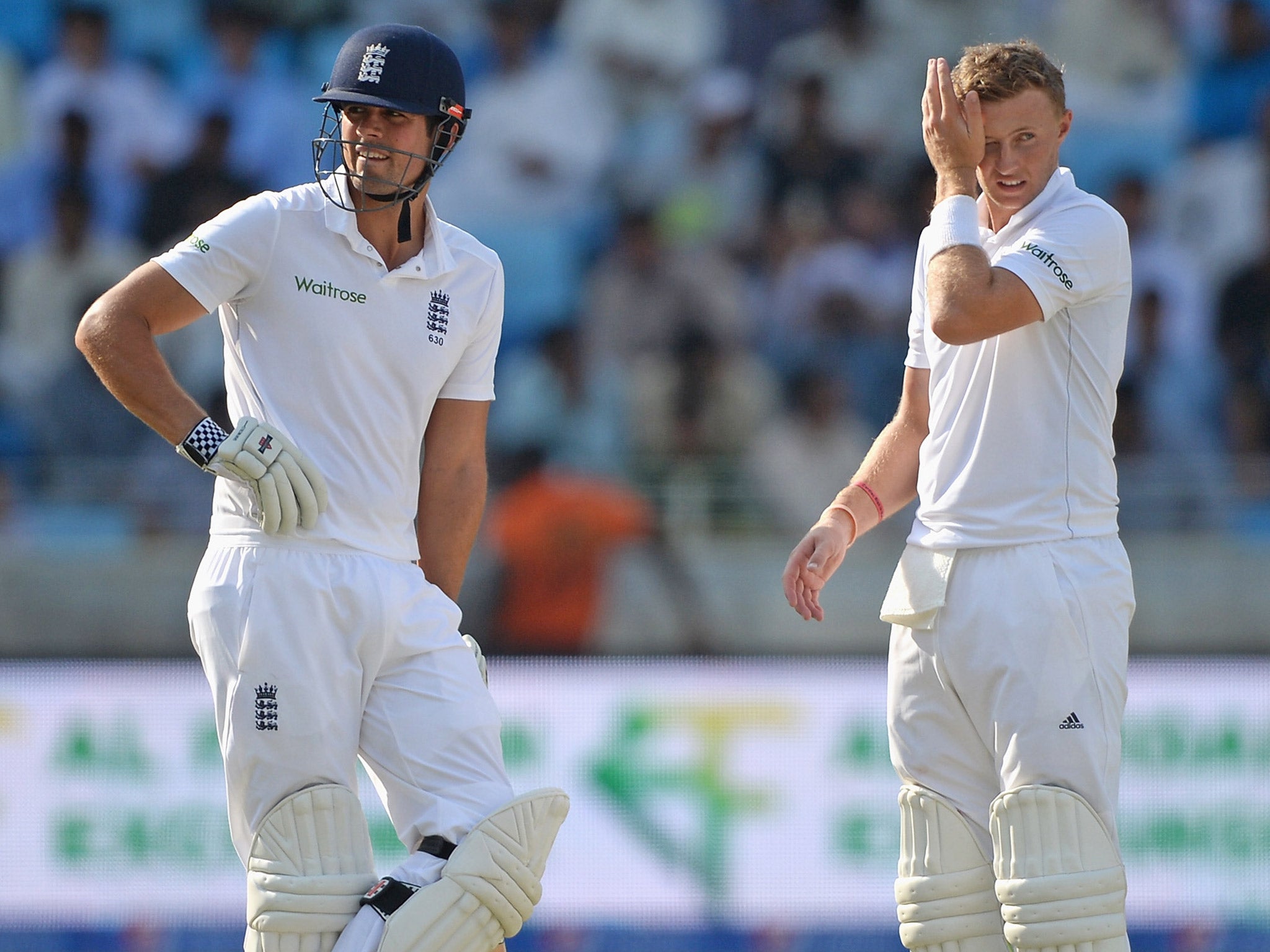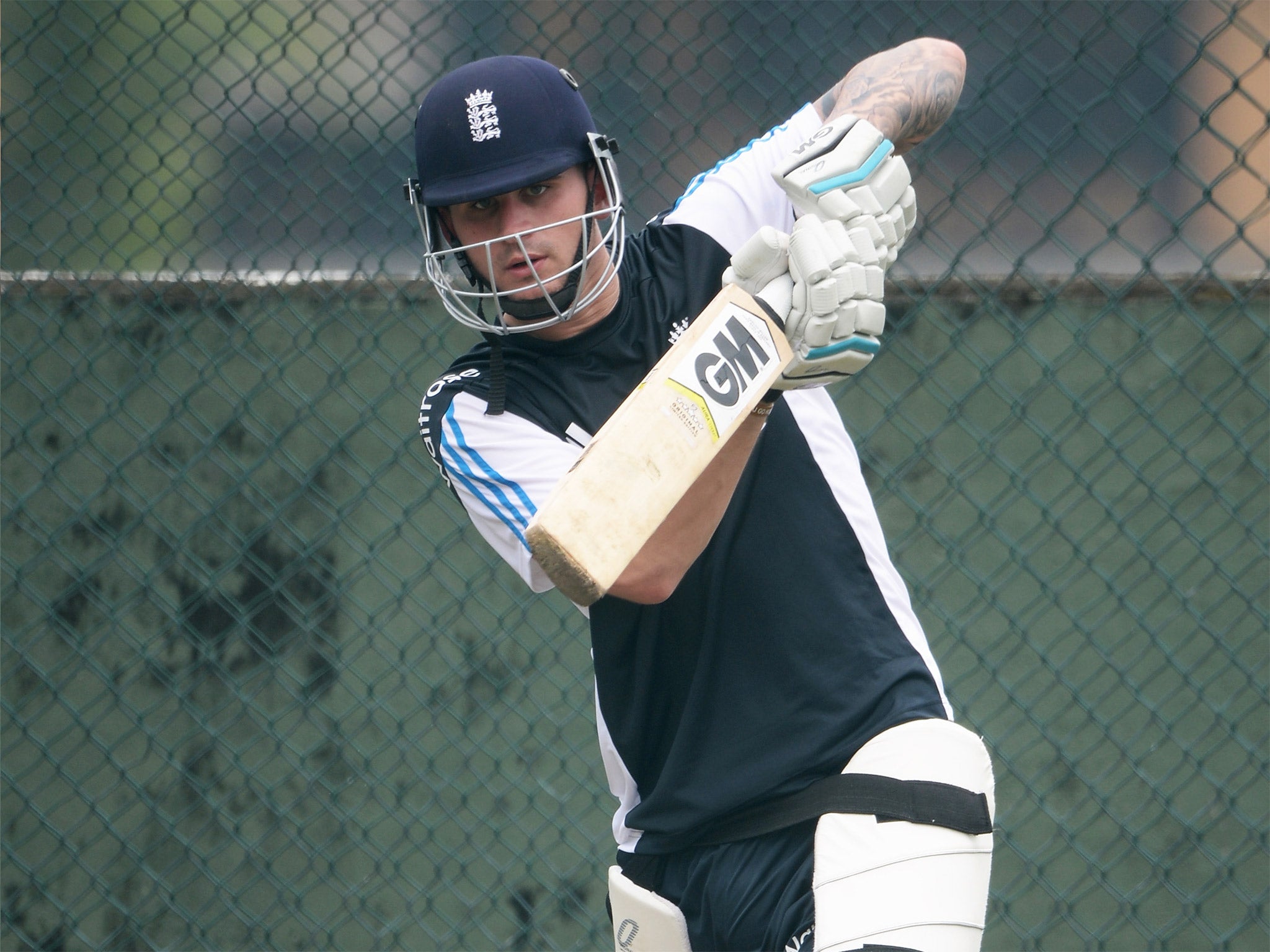England’s cricketing Fab Four need help from friends to reach No 1
Pakistan defeat revealed old failings and proved rest of the team rely too heavily on Cook, Root, Anderson and Broad

Your support helps us to tell the story
From reproductive rights to climate change to Big Tech, The Independent is on the ground when the story is developing. Whether it's investigating the financials of Elon Musk's pro-Trump PAC or producing our latest documentary, 'The A Word', which shines a light on the American women fighting for reproductive rights, we know how important it is to parse out the facts from the messaging.
At such a critical moment in US history, we need reporters on the ground. Your donation allows us to keep sending journalists to speak to both sides of the story.
The Independent is trusted by Americans across the entire political spectrum. And unlike many other quality news outlets, we choose not to lock Americans out of our reporting and analysis with paywalls. We believe quality journalism should be available to everyone, paid for by those who can afford it.
Your support makes all the difference.England embark on their fifth, final and toughest Test assignment of a gruelling year today. Anyone who saw their recent travails in the desert, paid attention to the remarkable manner in which they reclaimed the Ashes during the summer, or noted the difficulties encountered in the past month by their vaunted opponents, may quibble about the magnitude of the task that awaits.
But if England can win – and this is an “if” that is off the scale – in South Africa, it would demonstrate that their declared ambition to reclaim the world No 1 Test ranking is no mere pipe dream. South Africa hold top place at present, after years of resilient, controlled and efficient cricket, but their status is suddenly under threat. Lose to England and they will be supplanted by India.
Form is no reliable guide to the series of four matches which starts in Durban on Boxing Day. England have already played 13 Test matches in 2015, winning five and losing six, which translates into two series drawn, one won and one lost. That the victory was in a thrilling rubber against Australia, which was part of a rip-roaring summer, makes everything else bearable, of course.
The edge was hardly taken off it by the defeat last month against Pakistan in the UAE which was all too predictable. Not only did it show up many of their old failings in conditions favourable to slow bowlers – they are in good company there – but it also continued a run in which too few of the batsmen and bowlers are scoring the runs and taking the wickets – almost invariably the same batsmen and the same bowlers.
South Africa may be chastened by their experiences in India. Having been unbeaten in Test series away from home for nine years, utterly in the face of the trend they were overwhelmed 3-0. A stoic, ultimately failed rearguard action in the final Test, when they scored 143 off as many overs in their second innings, could not disguise their frailties.
This is now a series between sides who both have a couple of star turns but are both casting around for a settled, trustworthy batting order. Both, too, possess some enviable pace bowling but no spin to write home about.
The tour comes during troubled times for the concept of Test cricket. The old boy is uncertain where it stands in the modern world and is not entirely sure it has a place. Various ideas are being used to try to ensure its survival, the latest being a hugely popular, if slightly flawed inaugural floodlit Test in Adelaide when a pink ball was used.
If this was probably as essential as it was inevitable – the feeling that something had to be done was irresistible – there remained about it the air of an ageing matinee idol growing his hair, wearing hipsters, undoing the top three buttons on his shirt and dabbing on the aftershave in the misguided belief that it will prolong his allure. At least two of the four matches, in front of holiday-season crowds in Durban and Cape Town, can be fairly certain of reasonable crowds in a country which has resolutely resisted attendance at Tests despite the standing of their team.
England can, as ever, be sure of plenty of vocal support but they depart amid familiar navel-gazing. The latest small, but strangely meaningful contribution to the debate was the glaring omission of any cricketer from the shortlist of 12 for the BBC Sports Personality of the Year Award.
This has persuaded some cricketers – and some cricket pundits – to voice concerns about the game’s place in British society. It says more about the selection panel (with due apologies to the great Dames of sport, Mary Peters and Tanni Grey-Thompson, who were on it). The prowess of the individuals on its eventual list is not in question but that cricket could be overlooked after a sparkling, constantly exciting summer when the Ashes came home, casts abundant doubt on its credentials for the task at hand.
Joe Root is the world’s official top Test batsman; Alastair Cook, the captain, has made more Test runs this year than any other batsman; Jimmy Anderson became the first England bowler to 400 Test wickets; Stuart Broad took 8 for 15, the best English bowling performance against Australia for 59 years. One of them might – should – have tickled the judges’ fancy and saved us the angst.
Mention of that quartet betrays England’s strengths and also their weaknesses. They are all grand, probably great cricketers but at the moment they are doing too much for the team. Or at least the rest of the team are allowing them to do too much.
Root and Cook, between them, have scored 2,645 of England’s 7,245 runs this year, 36.5 per cent. Anderson and Broad have taken 97 of the 224 wickets, or 43.3 per cent. It is why England’s selectors, while offering silent prayer along with the rest of us that they stay fit, are casting their net elsewhere.
The likely batting order for the series has provided most of the conversational fare since the squad was announced. Cook, it is favoured, will have his eighth designated opening partner since the end of his durable alliance with Andrew Strauss in 2012. Following Moeen Ali’s moderate returns and lapses of temperament against Pakistan, it seems that Alex Hales will be the latest to drink from the poisoned chalice. For all his deeds in limited-overs cricket, he will never have seen anything like this.

If Dale Steyn is fit, as he is expected to be after missing three matches in India with a groin injury, the partnership with Morne Morkel will ask questions of Hales’ method and approach that he has probably not imagined, let alone experienced.
There is a case for asking Nick Compton, recalled after more than two years, to open as he did with such earnest resolution in his nine previous appearances, but it looks as though the equally vexatious No 3 berth has been earmarked for him, now that Ian Bell has been jettisoned.
James Taylor will continue at five after a successful recall in Sharjah and Jonny Bairstow should be offered the opportunity to extend his place as the side’s wicketkeeper-batsman. Bairstow has never quite given an air of permanence as a Test player and, with Jos Buttler probably still the preferred option in the dual role, he may have to contribute pretty quickly.
A sidekick is also needed for the Anderson-Broad axis. Liam Plunkett, who was not given a chance to do anything wrong, can consider himself wronged not to be here. The selectors clearly see something in the generous left-arm pace of Mark Footitt, not deterred by the fact that his copious amount of wickets have come in Division Two, but the estimable Chris Woakes may be the wiser option.
South Africa have their own concerns. They insist that the Indian defeat will regalvanise the side, but most of the players were temporarily muted in Asia. As ever, the balance of their XI may be compromised by the obligation to include four players of colour, at least one of whom must be black African. Though the pool of likely candidates is at last deepening, the demand still causes much perplexity to their selectors.
England’s first match, in Potchefstroom next Tuesday, will be against a team largely consisting of players from the South African academy. This may not be completely straightforward but it will be by a distance the least demanding match of the trip.
Join our commenting forum
Join thought-provoking conversations, follow other Independent readers and see their replies
Comments